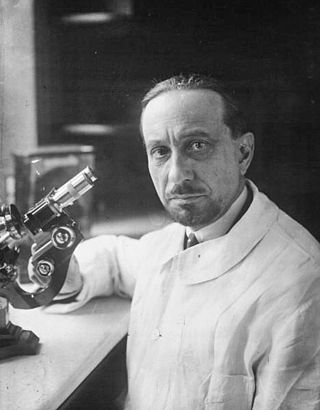Gustave-Roussy School of Cancer Sciences
Together with the Faculty of Medicine of the University of Paris-Saclay, the Institut Gustave Roussy runs the School of Cancer Sciences, a university division specializing in oncology. The lessons take place at the Cancer Campus in Villejuif in the Val-de-Marne.
In the various courses offered by the faculty of medicine (adult, adolescent and child oncology; surgery; best practices; medical imaging; radiotherapy; other courses), the establishment integrates the Doctoral School of Oncology, Biology, Medicine, Health (and its Master 2 in Biology and Health, Cancerology specialty), created with the École Normale Supérieure Paris-Saclay. [3]
Directed in 2015 by Pierre Blanchard, the school had trained nearly 2,800 students and awarded 26 university degrees. [3]

The Jawaharlal Institute of Postgraduate Medical Education & Research (JIPMER) is a medical school located in Pondicherry, India. JIPMER is an Institute of National Importance (INI) and a tertiary care referral hospital. It is under the direct administrative control of the Ministry of Health and Family Welfare, and Indian Government, with autonomy to run its internal administration.

Loyola Medicine, also known as Loyola University Health System, is a quaternary-care system with a 61-acre (25 ha) main medical center campus in the western suburbs of Chicago, in the U.S. state of Illinois. The medical center campus is located in Maywood, 13 miles (21 km) west of the Chicago Loop and 8 miles (13 km) east of Oak Brook. The heart of the medical center campus is the Loyola University Medical Center. Also on campus are the Joseph Cardinal Bernardin Cancer Center Loyola Outpatient Center, Center for Heart & Vascular Medicine and Loyola Oral Health Center as well as the Loyola University Chicago Stritch School of Medicine, Loyola University Chicago Marcella Niehoff School of Nursing, Center for Translational Research and Education, and the Loyola Center for Fitness.
The Leopold Griffuel Prize for translational and clinical research is sponsored by the French ARC Foundation for Cancer Research.

Gustave Roussy was a Swiss-French neuropathologist born in Vevey, Switzerland.

University of Versailles Saint-Quentin-en-Yvelines is a French public university created in 1991, located in the department of Yvelines and, since 2002, in Hauts-de-Seine. It is a constituent university of the federal Paris-Saclay University.

Greater Paris University Hospitals is the university hospital trust operating in Paris and its surroundings. It is the largest hospital system in Europe and one of the largest in the world. It receives an average of more than 10 million patients per year.
Ralph Weissleder is an American clinician scientist.

Georges Mathé was a French oncologist and immunologist. In November 1958, he performed the first successful allogeneic bone marrow transplant ever performed on unrelated human beings.
Ann Barrett OBE, is Emeritus Professor of Oncology in the University of East Anglia, England, and formerly deputy dean of the School of Medicine and lead clinician for oncology at the Norfolk and Norwich University Hospital NHS Trust. She was awarded an OBE in 2010 for services to medicine. She is also a fellow of the Royal College of Surgeons in Ireland.
Michael John Peckham was a British oncologist and artist. As a cancer physician he is best known for his contribution to the treatment of testicular cancer. His paintings were first exhibited in 1962 and he showed in numerous mixed and solo exhibitions.

The Institut SupBiotech de Paris is a French private engineering school created in 2003, located in Villejuif, near Paris, and in Lyon.
Cancer Campus is a research and innovative campus in oncology located in Villejuif, close to Paris, and launched in April 2006. It is devoted to help to fight cancer.

Paris-Saclay University is a combined technological research institute and public research university in Orsay, France. Paris-Saclay was established in 2019 after the merger of four technical grandes écoles, as well as several technological institutes, engineering schools, and research facilities; giving it fifteen constituent colleges with over 48,000 students combined.
Odile Schweisguth (1913-2002) was a French physician who is considered the pioneer of pediatric oncology in Europe and was the founder of the first child cancer department at the Institut Gustave Roussy (IGR) in Villejuif.
The Organisation of European Cancer Institutes (OECI) is an international non-profit organization with European Economic Interest Grouping status. It was created in 1979 to promote greater cooperation among European cancer centers and institutes. Its head office is located in Brussels at the Belgian University Foundation.
Laurence Zitvogel is a French physician-scientist specializing in oncology and immunology. Zitvogel is a clinical oncologist, a researcher in the Laboratory of Tumor Immunology and Immunotherapy, and a professor at Paris-Saclay University. She has studied the correlation between the immune system and the success of cancer treatments for over 30 years. Her primary research experience lies in exosomes, studying the biological impact of structural abnormalities on malignant neoplasms, and anti-tumor therapy. Through her work as a professor and researcher, Zitvogel discovered that chemotherapy could delay the growth of tumors in mouse models. Her team reported the first anticancer probiotic, Enterococcus hirae. As of 2020, she is researching an effective and inexpensive diagnostic test to predict dysbiosis and is investigating the promising lead on the role of gut microbiotes in anti-tumour immunotherapy.
Sophie Postel-Vinay is a French physician and scientist at the Institut Gustave Roussy where she has led an ATIP-Avenir team since 2018. She works on oncology and the development of new drugs and is an expert in early clinical trials. She was the 2019 winner of the Irène Joliot-Curie Prize in the “young woman scientist” category.
Danièle Brun was a French academic and psychologist. She was a member of the Espace analytique.
Maurice Tubiana was a French radiologist, oncologist, and researcher renowned for his contributions to cancer treatment and radiobiology. He was a key figure in advancing radiotherapy and cancer research in France during the 20th century.
This page is based on this
Wikipedia article Text is available under the
CC BY-SA 4.0 license; additional terms may apply.
Images, videos and audio are available under their respective licenses.









